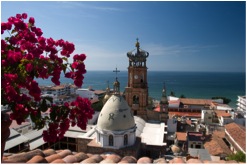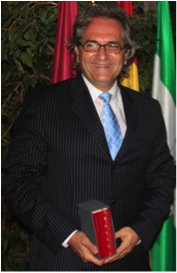Negotiate like a Phoenician
Since this spring IMADEC offers a new diploma-program with Professor Habib Chamoun-Nicolas beside the known Master programs – "The Advanced Negotiation Program which gives the participants the tools to be successful optimizing the results and the relationships."
The program consists of four modules of four-day duration per module with different topic focuses: negotiation and conflict resolution, international trade and diplomatic negotiations, communication and persuasion and selling methodologies for business development and ends with a Advanced Negotiation Program Diploma. Prof. Chamoun teaches according a new method developed by him-self. To introduce the innovative program and the unique method of negotiating we spoke to Prof. Chamoun.
Prof. Chamoun, please could you give us an overview of the topics of the new advanced negotiation program diploma and the method used?
Yes, this is a unique advanced negotiation program not only in the sense of teaching the best practice from the concepts that professors in Harvard or MIT teach, but we incorporate also the best practices from the best negotiators ever from history; the Phoenicians and their way of doing business.
We are combining the old and the new school of negotiation and doing business, which makes the substance very rich. Participants will learn not only theoretical but the best practice from the experience of the ages. This program combines what we’ve learned from the occidental and oriental worlds. This is very important to understand different cultures, cross-cultural communication and persuasion and how this affects the negotiation process. So it is not a typical or standard negotiation program.
It is a diploma for people who want to improve also soft-skills like their communication skills, business development skills, how to persuade, talking with other people about their feelings during the negotiation, so they can both gain not only a long term relationship but also improving the results of the negotiations. We cover many negotiation situations, from single-issue two parties, multiple issue- two parties, to multiple issues, multiple parties negotiations.
We start for example with a negotiation between a husband and his wife negotiating what car to buy, then adding a car dealer for price negotiations, next issue could be a financing issue, adding a bank clerk and so on. We make the negotiation situation as complex as possible to guide students to experiment and be able to negotiate also multinational trade issues, even diplomatic issues.
The students have the ability to use all modern tools like internet, chat, texting for the negotiations in the class room because these tools also changed the way of negotiations today. This is important for students to learn how to better use technology for their daily negotiation situations. So this course is very complete in that sense that we cover also all new things and tools and we are always reinventing ourselves, so that we can provide always the best services. And IMADEC is a great platform for this new program because always is leading in Austria with the most professional students.
Is IMADEC the only university, which offers an advanced negotiation program according to this method?
Yes. I’ve been going around the world and what I tried to do is not to do the typical things that everybody else is offering. The typical most known method everywhere in the world as far as negotiation methodology is the Harvard method or the tactics of negotiations many people teach but this program goes beyond that. Not only we use cases and role-plays form Harvard, and many other top universities worldwide, in addition we cover more tools, all the way from prospecting to closing a deal and cover negotiation from all the different areas. As I know, this is quite unique.
How long did it take you to develop this method?
Oh, it has been a long time because I’ve been going through the Harvard program of negotiation and I’ve studied the negotiation process and practiced it for the last 15 years. To get to this point has been a long try and error process in my experience of 35 years of negotiating actual real projects worldwide from small to large ones. I think in total it took me about seven years to come out with this academic program gathering my own real negotiation experience with teaching methodologies and experimenting worldwide.
At the beginning I taught what everybody teaches but renewed every time when I had a new experience teaching negotiation. I worked for the last seven years with many worldwide professors to improve negotiation teaching and we worked on exploring the negotiation what is called adventure learning, discovering in the street better ways to teach, teaching the street negotiation and bringing the street to the classroom, so that the students can practice it. And that is the best model to learn.
It’s like oncological coaching – to teach and show them by doing and then bring the experiences they learned by doing into the classroom and back to the street to practice. I know that this has being taught since Aristotle, but you need to apply it. I’ve been to so many countries like China, Turkey, Indonesia or Japan and many more, and I found out that there they do not teach in that way. The professors don’t start dialoging and the students don’t give feedback, it is always like a one-way street, professor-centric teaching rather than student-centric teaching. The best way to learn is to practice things – learning by doing. Once I was in Africa I took my students to a football game where I have asked them to negotiate different things, to practice not only in the classroom but also in the street.
In fact, I believe in order to become the expert on something, say Negotiations, the expert needs to stretch their knowledge and skill-set to the most unthinkable professions or fields to test and apply their knowledge or to learned new ideas in the expert’s field. This is why I have recently been applying the negotiation principles for combative sports specifically to boxing referees in professional boxing. When the referees need to resolve a conflict in the ring in a split of a second decision we have developed a tool my colleague Dr. Hazlett and I for conflict management in this situation. This is the kind of things that students get in my courses that is difficult to get in others ones. We are constantly researching new ideas and ways to apply negotiation techniques in different fields.
At IMADEC I do the same things now. The students get a follow up activity from me. In addition to turn a term paper they have the option to contact me with specific problems that I can guide them through feedback and follow up the class, sometimes it turns up to be the term paper subject; it is more like how did you apply what you have learned in the class? That is something unique and the students appreciate that very much.
You have written also a book called “Negotiate like a Phoenician”. Is this book the base for the new advanced negotiation program?
Yes, it’s part of the course. I’ve written before Negotiate like a Phoenician another one called “Deal – The Guidelines for a Flawless Negotiation”. Ideally before every minute of negotiation you need at least one minute of preparation according to negotiation experts. What I did before, I tried to analyse different cases and see what makes them more successful. Then I came up with the six P’s analysis of negotiation as a tool for preparation, (person, problem, process, prognosis, product and power), and I used that as an analysis tool in real negotiation cases and feedback my courses with the experimental data. But in the book “Negotiate like a Phoenician” I wrote about the principles of great negotiators of the history.
The Phoenicians were the only civilisations that conquer economically the ancient world without a war. They actually did it through peace by negotiating with their enemies from different cultures and religions. They were not the powerful ones, so they had to negotiate with the powerful ones for their existence. That’s why I thought it is interesting to take a closer look at that. There were professors such as Sanford Host in the past that looked at the seven principles of the Phoenicians like e.g. privacy, respect to woman, equality, tolerance, international trade, making alliances with the enemy, etc. It is important to analyse the Phoenician basic principles, because if you apply these principles to negotiation, you cannot fail. In negotiation you have to try to understand the other first and then yourself.
That brings me to another point: In the course we cover also the topic of conflict resolution as well. We analyse different type of conflicts. For instance, conflicts within a company or personal conflicts at home. I also teach negotiation as a tool of conflict resolution and mediation. We use also a simulation-tool from the ICONS project simulation at the University of Maryland to practice negotiations on multinational diplomatic conflicts or multinational trade agreements. I was told by the ICONS project simulation team that this is the first time that somebody uses a diplomatic negotiation tool for a business school.
I think that’s very important to see how diplomatic negotiation works and what are the impacts of diplomacy on daily business cases. So, I’m looking permanent for new ways of improving and practicing different tools to better teach and conduct negotiations. I’m a real passionate negotiator.
As the feedback of the students was really good you’ll expand your offer in 2013. You will offer your negotiation course also to companies for their employees not studying at IMADEC. Can you tell us something about this plan?
Yes, because of the students’ positive reactions to this advanced negotiation program - they want to apply their learning’s to their companies on a broader basis and the fact that I really love Austria; the more I come, the more I like it – I’ll offer such a program for companies in conjunction with IMADEC at the beginning of next year.
I’ll come to the companies and will help them to work on their internal issues like communication issues, persuasion issues, conflict and negotiation issues, to mention a few. It will be a very effective way to work on these issues and to help them with the company environment. Because it is the environment of a company what makes it strong or weak.
During the program it will also be possible to work with their real company cases. I’ll ask them if they want to bring in an anchor-case for the negotiation course. Then with the participants anchor case, we can work and practice on their real business cases. And of course they will get a follow up with consulting and coaching units. I think there will be a fast return on investment for this advanced negotiation program.
As you said before you are a real passionate negotiator – you negotiate things just for fun also in your private life. Could you give us an example?
Yes, that is true and you can see me now getting very emotional. When we teach the Phoenician model of negotiation we are talking about the concept of Tradeables. The simplest thing to talk about Tradeables is to do well onto others and don’t expect anything in return. If you think about that concept, definitely something will come to you, even if you won’t expect it. I’ve proven it with business cases and I’ve seen it repeat itself in the history. Based on that principle
I’m passionate about two cities which are far away from each other. One is in Mexico called Puerto Vallarta and the other is Cadiz in Spain. I’m passionate about those two port cities since I was a teenager. When I was there in both cities for the first time, I have a similar feeling: I felt so energetic, so spiritual, and so great. That, I thought how could I bring this passion for those cities and my passion for negotiation into my life?

Cadiz, Spain. Source: Patronato Turismo Cadiz
I found myself giving a conference about my book “Negotiate like a Phoenician” in Cadiz this summer, invited by the mayor of Cadiz Teofila Martinez and Don Enrique Garcia Agullo. By the way, Cadiz was founded by the Phoenicians 1.100 b.c.. And also another interesting data is that recently Dr. Manolo Calero and the group of archeologist led by Jose Geber made a major discovery in Phoenician history in our days, two Phoenician skeletons dated 600 and 800 b.c.. As one of them was found on Valentine’s Day, they called him Valentine. Then I had the idea to make a sister-city-arrangement between Cadiz and Puerto Vallarta and having a Phoenician exhibition worldwide from Cadiz to Puerto Vallarta. I started talking to everybody about this idea. I call this project “Valentine the Phoenician Voyager – the return of a myth. Rediscovering America. From Cadiz to Puerto Vallarta”, because there is the myth that the Phoenicians came from Europe to America long before Christopher Columbus.

Puerto Vallarta, Mexico
Source: Puerto Vallarta Tourism Board
I think this idea will be founded very interesting to all people around the globe and all ages will get very enthusiastic about it. And people will think about it and question and why Cadiz, and why Puerto Vallarta? And suddenly everybody will be talking about the two cities and would like to get to know more about them. The People in Cadiz I talked to loved the idea this summer.
In November I was coincidentally a special guest to Puerto Vallarta during the 1st International festival for Puerto Vallarta sister cities. I met 18 ambassadors of all over the world and presented my idea to the five of them with a Phoenician history – namely Morocco, Egypt, Italy, Portugal and Cypress. They were extremely excited about my idea and wanted to be part of the exhibition. Next days the newspapers were full of my ideas I’ve presented and even better I was in the front page of the local Puerto Vallarta Opina newspaper.
I believe when you are passionate about something and you are able to transmit this passion to many others from different countries, ages and cultures you really found your essence within. Then, you can transmit the passion to millions, generation after generation, and then you make a mark in life.
Now I plan to go back to Cadiz and will refer to the positive return I got in Puerto Vallarta and will create strong emotions to make it happen. With a newspaper talking about it and with the news all over it I am positive the sister cities idea will become a reality.
In this case the strategy is to talk to “make noise” (talk to many people as possible) that the force is coming from the people. My goal is that in the beginning of next year we have at least a signed agreement between Cadiz and Puerto Vallarta. The next step will be to plan the exhibition. So, I really do believe in this project and it is a good example what you can achieve when you apply what you have learned about negotiation.
From where comes your big passion for the Phoenician culture?
When I was a teenager I went to Cadiz and I visited the Cadiz museum and for the first time in my life I saw physically two of the biggest Phoenician sarcophaguses. For me those sarcophaguses made a big impact in my life and I kept it in the back of my mind for a long time.
After my Doctorate studies at the University of Texas at Austin and my post doctorate degree in Pau, France and working for many fortune 500 companies, starting my academic carrier, I was asking myself who were the most famous negotiators through history? And in every historic book you could read about the Phoenicians as the great sailors and they were great negotiators. This fact combined with my impression of the sarcophaguses in my teenager years, led to my passion for the Phoenicians.
Then I requested to my colleague and friend Dr. Randy D. Hazlett a great researcher with many patents registered in his name who help me as a coauthor of the book, especially who didn’t know anything about the Phoenicians at that time and was the most objective person for the work. So we started to investigate why the Phoenicians were so great at negotiations and we came out with the Phoenician model of negotiations.
My personal background, I was born and raised in Mexico but from Lebanese parents, helped me also to understand the culture of the Phoenicians. And there are so many things still uncovered and mystic. And the older I get, the more excited I get about these things. We are too dependent on technology today, but it is only a tool. So we had to go back in history to find the truth.
Thank you for the interview!






